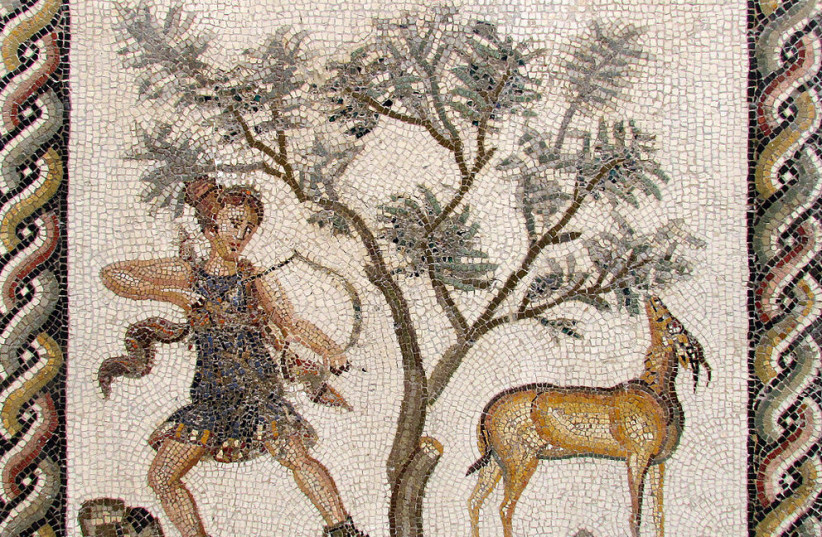
Alzheimer’s disease (AD) – the most common type of dementia – was first discovered by clinical psychiatrist Dr. Alois Alzheimer who described a 50-year-old woman, Auguste Deter, in a Frankfurt psychiatric hospital in 1901.
It affects one person in 14 people over the age of 65. one in every six people over the age of 80, and one in three in people aged 85 and older.
But did AD always affect the population? The Bible – which doesn’t hide illnesses – has no mention of it; some of our forefathers and foremothers (but not Sarah) suffered from vision problems, weakness, and other physical problems at the end of their lives, but nothing about dementia.
Medical texts from 2,500 years ago rarely mention severe memory loss, suggesting today’s widespread dementia stems from modern environments and lifestyles, according to a new study at the University of Southern California.

A mosaic of the Roman goddess of the hunt, Diana, hunting a doe. (credit: Wikimedia Commons)
A mosaic of the Roman goddess of the hunt, Diana, hunting a doe. (credit: Wikimedia Commons)
A new analysis of classical Greek and Roman medical texts suggests that severe memory loss – occurring at epidemic levels today – was extremely rare 2,000 to 2,500 years ago, in the time of Aristotle, Galen, and Pliny the Elder.
The research, published in the Journal of Alzheimer’s Disease under the title “Dementia in the Ancient Greco-Roman World Was Minimally Mentioned,” bolsters the idea that Alzheimer’s disease and related dementias are diseases of modern environments and lifestyles, with sedentary behavior and exposure to air pollution largely to blame.
“The ancient Greeks had very, very few – but we found them – mentions of something that would be like mild cognitive impairment,” said first author and gerontologist Prof. Caleb Finch. “When we got to the Romans, and we uncovered at least four statements that suggest rare cases of advanced dementia; we can’t tell if it’s Alzheimer’s. So, there was a progression going from the ancient Greeks to the Romans.”
Historical mentions of memory loss
Ancient Greeks recognized that aging commonly brought memory issues we would recognize as mild cognitive impairment) but nothing approaching a major loss of memory, speech, and reasoning as caused by Alzheimer’s and other types of dementia, he continued.
Finch and co-author Stanley Burstein, a historian at California State University in Los Angeles, pored over a major body of ancient medical writing by Hippocrates and his followers. The text catalogs ailments of the elderly, such as deafness, dizziness, and digestive disorders, but makes no mention of memory loss.
Centuries later, in ancient Rome, a few mentions crop up. Galen remarks that at the age of 80, some elderly begin to have difficulty learning new things. Pliny the Elder notes that the senator and famous orator Valerius Messalla Corvinus forgot his own name. Cicero prudently observed that “elderly silliness … is characteristic of irresponsible old men, but not of all old men.”
The Greeks and Romans were mainly concerned with the physical frailties of older ages. Finch speculates that as Roman cities grew denser, pollution increased, driving up cases of cognitive decline. In addition, Roman aristocrats used lead cooking vessels, lead water pipes and even added lead acetate into their wine to sweeten it – unwittingly poisoning themselves with the powerful neurotoxin.
A few ancient writers recognized the toxicity of lead-containing material, but little progress was made in dealing with the problem until well into the 20th century. Some scholars blame lead poisoning for the fall of the Roman Empire.
For this paper, Finch didn’t just think about the Roman Empire or the Greeks. In the absence of demographic data from these ancient cultures, Finch turned to a surprising model for ancient aging – today’s Tsimane Amerindians, an indigenous people of the Bolivian Amazon.
The Tsimane – like the ancient Greeks and Romans – have a preindustrial lifestyle that is very physically active, and they have extremely low rates of dementia. An international team of cognitive researchers led by psychology and gerontology Prof. Margaret Gatz found among older Tsimane people.
“The Tsimane data, which is serious, is very valuable,” Finch said. “This is the best-documented large population of older people that have minimal dementia, all of which indicates that the environment is a huge determinant on dementia risk. They give us a template for asking these questions.”
News Related-
Russian court extends detention of Wall Street Journal reporter Gershkovich until end of January
-
Russian court extends detention of Wall Street Journal reporter Evan Gershkovich, arrested on espionage charges
-
Israel's economy recovered from previous wars with Hamas, but this one might go longer, hit harder
-
Stock market today: Asian shares mixed ahead of US consumer confidence and price data
-
EXCLUSIVE: ‘Sister Wives' star Christine Brown says her kids' happy marriages inspired her leave Kody Brown
-
NBA fans roast Clippers for losing to Nuggets without Jokic, Murray, Gordon
-
Panthers-Senators brawl ends in 10-minute penalty for all players on ice
-
CNBC Daily Open: Is record Black Friday sales spike a false dawn?
-
Freed Israeli hostage describes deteriorating conditions while being held by Hamas
-
High stakes and glitz mark the vote in Paris for the 2030 World Expo host
-
Biden’s unworkable nursing rule will harm seniors
-
Jalen Hurts: We did what we needed to do when it mattered the most
-
LeBron James takes NBA all-time minutes lead in career-worst loss
-
Vikings' Kevin O'Connell to evaluate Josh Dobbs, path forward at QB
